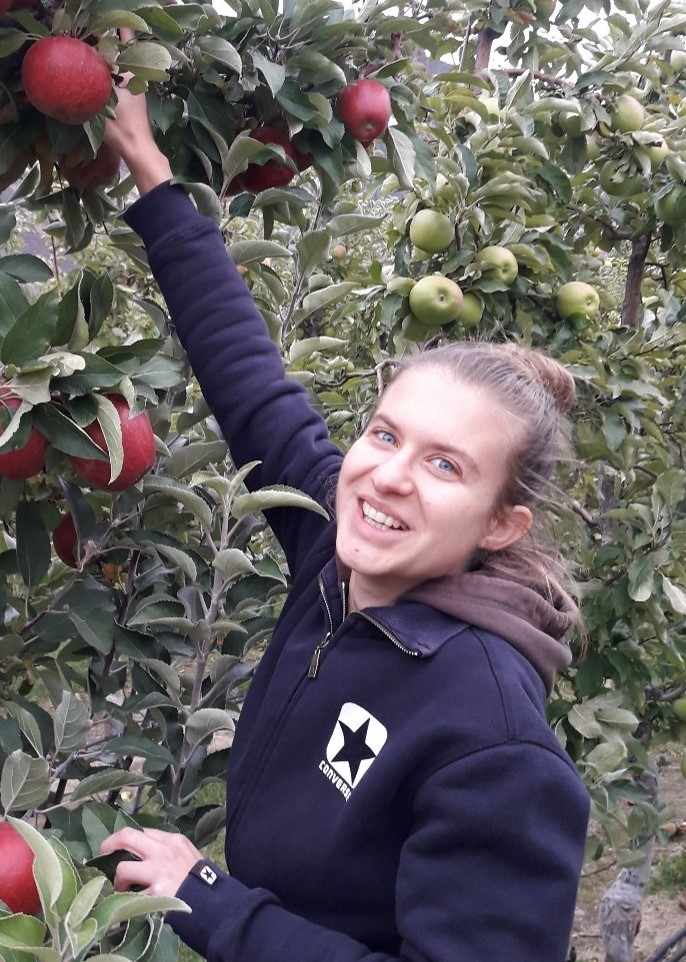CSHS Student
Committee Co-chair and Student Representative for British
Colombia
 Hi!
I’m Claudia Baldassi, a PhD student in Plant Science at UBC.
My research project focuses on understanding the genetic
control of red raspberry fruit color. Interestingly, the
raspberry industry requires berries with different red
intensities depending on the market targeted; dark red fruit
is usually needed for processing applications, while bright,
medium red colors are preferred for the fresh market. To
date, the genetic determinants underlying red fruit color
and specific shades of red are still unknown, making
breeding for desired fruit color a challenging task. The
goal of my project is to pinpoint the genetic variation
underlying different shades of red and to develop molecular
markers associated with such variation. Ultimately, my
project could provide breeders with tools to optimize the
selection of raspberry cultivars with preferred red
intensities. When I am not in the lab, you can find me
hiking in the Pacific Northwest or experimenting in the
kitchen! Hi!
I’m Claudia Baldassi, a PhD student in Plant Science at UBC.
My research project focuses on understanding the genetic
control of red raspberry fruit color. Interestingly, the
raspberry industry requires berries with different red
intensities depending on the market targeted; dark red fruit
is usually needed for processing applications, while bright,
medium red colors are preferred for the fresh market. To
date, the genetic determinants underlying red fruit color
and specific shades of red are still unknown, making
breeding for desired fruit color a challenging task. The
goal of my project is to pinpoint the genetic variation
underlying different shades of red and to develop molecular
markers associated with such variation. Ultimately, my
project could provide breeders with tools to optimize the
selection of raspberry cultivars with preferred red
intensities. When I am not in the lab, you can find me
hiking in the Pacific Northwest or experimenting in the
kitchen!
Ontario Provincial
Representative
 My
name is Sarah Koeppe and I am a masters student in the
department of Plant Agriculture at the University of Guelph.
I also completed my BSc at the University of Guelph with a
major in Plant Science and focused my extracurriculars and
course load around plant pathology and disease management
strategies. My current research is being conducted in the
lab of Dr. Melanie Kalischuk where I am researching the use
of RNA interference as a method to control a fungal pathogen
of strawberry. My research is looking into the role of
double-stranded RNA (dsRNA) construct length and the use of
encapsulation methods to increase the overall of efficiency
of RNAi when dsRNA is applied exogenously. The goal of my
research is to further our understanding of RNAi and its
role as a crop protection strategy and to provide the
groundwork for the development of an RNAi-based control
method. Outside of my research I love to go hiking to find
interesting native plants and I love adding to and tending
to my rapidly growing garden! My
name is Sarah Koeppe and I am a masters student in the
department of Plant Agriculture at the University of Guelph.
I also completed my BSc at the University of Guelph with a
major in Plant Science and focused my extracurriculars and
course load around plant pathology and disease management
strategies. My current research is being conducted in the
lab of Dr. Melanie Kalischuk where I am researching the use
of RNA interference as a method to control a fungal pathogen
of strawberry. My research is looking into the role of
double-stranded RNA (dsRNA) construct length and the use of
encapsulation methods to increase the overall of efficiency
of RNAi when dsRNA is applied exogenously. The goal of my
research is to further our understanding of RNAi and its
role as a crop protection strategy and to provide the
groundwork for the development of an RNAi-based control
method. Outside of my research I love to go hiking to find
interesting native plants and I love adding to and tending
to my rapidly growing garden!
|
|
Ontario Provincial
Representative
 My
name is Ifesinachi Nelson Ezeh. I am a second-year master's
student at the department of Plant Agriculture, University
of Guelph. I completed my first MSc and BSc. from Saint
Petersburg State Agrarian University, Russia with a major in
Crop Production, focusing on resistance of wheat to leaf
rust pathogen. My current research is being conducted in Dr.
Mary Ruth McDonald's lab where I am studying the performance
of Naio Orio robot in weed management of vegetable crops in
the muck soil of the Holland Marsh and mineral soil at the
edge of the marsh, and the collection of data for the
optimization of Picketa-Leaf Evaluated Nutrient System
(LENS) technology used for real-time leaf tissue assessment.
We hope to empirically determine if the robots are as
efficient as tractors, or better. Our primary objective is
to evaluate the efficacy of the electric agricultural robot,
Naio Orio, in comparison to conventional means of
cultivating and spraying in table beets and carrot crops on
high organic matter and mineral soils. The hypothesis is
that the robot is more effective than conventional weed
management on both soil types. Our second objective is to
assess the Picketa-LENS technology, which offers real-time
tissue testing for crop nutritional status. The hypothesis
is that the Picketa results are as accurate as lab tissue
tests. My
name is Ifesinachi Nelson Ezeh. I am a second-year master's
student at the department of Plant Agriculture, University
of Guelph. I completed my first MSc and BSc. from Saint
Petersburg State Agrarian University, Russia with a major in
Crop Production, focusing on resistance of wheat to leaf
rust pathogen. My current research is being conducted in Dr.
Mary Ruth McDonald's lab where I am studying the performance
of Naio Orio robot in weed management of vegetable crops in
the muck soil of the Holland Marsh and mineral soil at the
edge of the marsh, and the collection of data for the
optimization of Picketa-Leaf Evaluated Nutrient System
(LENS) technology used for real-time leaf tissue assessment.
We hope to empirically determine if the robots are as
efficient as tractors, or better. Our primary objective is
to evaluate the efficacy of the electric agricultural robot,
Naio Orio, in comparison to conventional means of
cultivating and spraying in table beets and carrot crops on
high organic matter and mineral soils. The hypothesis is
that the robot is more effective than conventional weed
management on both soil types. Our second objective is to
assess the Picketa-LENS technology, which offers real-time
tissue testing for crop nutritional status. The hypothesis
is that the Picketa results are as accurate as lab tissue
tests.
|
|
Student Representative for
Nova Scotia
 Aswin
Jeyapandian is a Master's student at Dalhousie University,
specializing in agriculture under the supervision of Dr.
Lord Abbey. His research focuses on the impact of Marine
waste based Biostimulants on the growth and productivity of
plants, contributing to the development of sustainable
agricultural practices. Aswin is deeply involved in both
community and academic activities. He has completed an
international internship, volunteered at Dalhousie Community
Day 2024, and served as a chaperone for a 7-day Awtiket
summer camp for Indigenous students. Aswin
Jeyapandian is a Master's student at Dalhousie University,
specializing in agriculture under the supervision of Dr.
Lord Abbey. His research focuses on the impact of Marine
waste based Biostimulants on the growth and productivity of
plants, contributing to the development of sustainable
agricultural practices. Aswin is deeply involved in both
community and academic activities. He has completed an
international internship, volunteered at Dalhousie Community
Day 2024, and served as a chaperone for a 7-day Awtiket
summer camp for Indigenous students.
During his undergraduate studies,
Aswin was the secretary of the Dr. Salim Ali Nature Club,
where he organized various events aimed at creating
environmental and sustainability awareness among the public
and school children. He also led several birdwatching
sessions, reflecting his passion for nature and wildlife.
In his free time, he enjoys bird
photography, playing football and badminton, and immersing
himself in nature. Known for his dedication, competitive
spirit, and approachable demeanor, Aswin is committed to
making a lasting impact in his field and community.
Chamali Kodikara, a
graduate student in Agriculture and Agri-food and the
University of Manitoba, is focused on identifying bioactive
compounds in Canadian Prairie berries using advanced
techniques such as LC-HRMS and GC-MS at the Canadian Center
for Agri-food Research in Health and Medicine. Successfully
detecting nearly 70 phenolic compounds, fatty acids, and
phytosterols in prairie berries, she excels in her research.
Chamali also serves as the President of the Graduate
Students Association at the Department of Food and Human
Nutritional Sciences, University of Manitoba, taking on
leadership roles in various student organizations and
contributing to scientific communities such as the Institute
of Food Technologists (IFT). Her involvement includes
chairing the Graduate Students Video Competition at IFT,
representing students at the Nutraceuticals and Functional
Food Division, and participating in the Women Resource
Group. Committed to leadership, Chamali's professional goal
is to complete her graduate studies, engaging in impactful
research as a scientist, and emerge as an influential leader
in her field.
|
Student
Representative for
Manitoba
 Chamali
Kodikara, a graduate student in Agriculture and Agri-food
and the University of Manitoba, is focused on identifying
bioactive compounds in Canadian Prairie berries using
advanced techniques such as LC-HRMS and GC-MS at the
Canadian Center for Agri-food Research in Health and
Medicine. Successfully detecting nearly 70 phenolic
compounds, fatty acids, and phytosterols in prairie berries,
she excels in her research. Chamali also serves as the
President of the Graduate Students Association at the
Department of Food and Human Nutritional Sciences,
University of Manitoba, taking on leadership roles in
various student organizations and contributing to scientific
communities such as the Institute of Food Technologists
(IFT). Her involvement includes chairing the Graduate
Students Video Competition at IFT, representing students at
the Nutraceuticals and Functional Food Division, and
participating in the Women Resource Group. Committed to
leadership, Chamali's professional goal is to complete her
graduate studies, engaging in impactful research as a
scientist, and emerge as an influential leader in her field. Chamali
Kodikara, a graduate student in Agriculture and Agri-food
and the University of Manitoba, is focused on identifying
bioactive compounds in Canadian Prairie berries using
advanced techniques such as LC-HRMS and GC-MS at the
Canadian Center for Agri-food Research in Health and
Medicine. Successfully detecting nearly 70 phenolic
compounds, fatty acids, and phytosterols in prairie berries,
she excels in her research. Chamali also serves as the
President of the Graduate Students Association at the
Department of Food and Human Nutritional Sciences,
University of Manitoba, taking on leadership roles in
various student organizations and contributing to scientific
communities such as the Institute of Food Technologists
(IFT). Her involvement includes chairing the Graduate
Students Video Competition at IFT, representing students at
the Nutraceuticals and Functional Food Division, and
participating in the Women Resource Group. Committed to
leadership, Chamali's professional goal is to complete her
graduate studies, engaging in impactful research as a
scientist, and emerge as an influential leader in her field.
Chamali Kodikara is the new
representative for Manitoba on the CSHS student committee.
She is a graduate student at Agriculture and Agri-food
Canada and the University of Manitoba and is focused on
identifying bioactive compounds in Canadian Prairie berries
using advanced techniques such as LC-HRMS and GC-MS at the
Canadian Center for Agri-food Research in Health and
Medicine. Successfully detecting nearly 70 phenolic
compounds, fatty acids, and phytosterols in prairie berries,
she excels in her research.
Chamali also serves as the President of
the Graduate Students Association at the Department of Food
and Human Nutritional Sciences, University of Manitoba,
taking on leadership roles in various student organizations
and contributing to scientific communities such as the
Institute of Food Technologists (IFT). Her involvement
includes chairing the Graduate Students Video Competition at
IFT, representing students at the Nutraceuticals and
Functional Food Division, and participating in the Women
Resource Group. Committed to leadership, Chamali's
professional goal is to complete her graduate studies,
engage in impactful research as a scientist, and emerge as
an influential leader in her field.
Student
Representative for
Alberta

My name is Natalie LaForest and I am a
graduate student at the University of Alberta. I completed
my diploma in ecology from Lakeland College and have a
Bachelors of Science in Agriculture, majoring in
Horticulture Science from the University of Saskatchewan. My
current research focuses on integrated weed management by
investigating species of carabids (ground beetles) in
different annual crops in Alberta. By using molecular gut
content analysis we will be able to identify which species
of weeds carabids are consuming in annual crops. In the
summer I spend a lot of time gardening, and in the winter I
spend a lot of time in greenhouses. One of my favourite
horticulture events in Alberta is the Orchid Fair where I
volunteered as a judge last year.
Student
Representative for
British Columbia

My name is Pin-Jui
Chen, and I am currently a second-year master’s student in
Plant Science at The University of British Columbia. It’s
not surprising that we can notice variability within a
vineyard regarding vine vigor and grape quality. The
intra-vineyard variability could be substantial regarding
vine vegetative growth, plant nutritional status,
reproductive growth, grape technological maturity, and grape
aroma. Understanding these variabilities is crucial
for optimizing vineyard management and making informed wine
production decisions. The quality of wine is a multifaceted
concept, heavily influenced by a wide range of sensory
attributes, among which aroma is a critical factor.
Volatile terpenoids, which contribute to
floral and citrus flavors, are key determinants of grape and
wine quality in aromatic grape cultivars such as Riesling
and Gewürztraminer. My research focuses on understanding
these intra-vineyard variabilities and revealing the
relationships among the aforementioned parameters. I also
assess the potential use of remote sensing techniques for
zone delineation, particularly for characterizing high
terpenoid zones efficiently and cost-effectively. Moreover,
I evaluate the
effectiveness of variable rate
fertilization as a strategy to
improve intra-vineyard uniformity.
|
